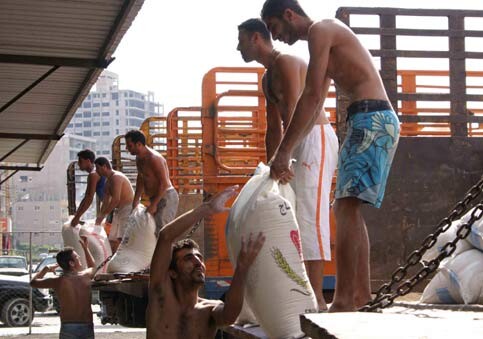United Nations News Service 4 August 2006

Volunteers unload flour from the first UN aid delivery to Tyre, 30 July 2006. (Hugh Macleod /IRIN)
Getting emergency United Nations humanitarian aid to the hundreds of thousands of Lebanese displaced by the worsening conflict became even harder today after the UN said that Israeli shelling had severed the vital supply route between Syria and Beirut, as well as forcing the cancellation of all but one convoy to the devastated south of the country.
“We do not have the humanitarian access we need for critical and vulnerable communities in south Lebanon and I was just informed that even for the UN material assistance, within three or four days unless they are able to replenish what they have they will run out of stocks,” UN spokesman Ahmad Fawzi told reporters in New York.
“Overnight bombing of the highway north from Beirut to the Syrian border has cut the road in three or four places and reportedly destroyed critical bridges and we are concerned about destruction along what has been the main supply route as it will greatly hamper our ability to deliver essential goods and emergency personnel.”
Mr. Fawzi said that all but one convoy of emergency aid for today had been cancelled, including one planned for the devastated southern port city of Tyre, from where most of its population have already fled, and he stressed that the aid effort was a race against time.
“Time is of the essence and every delay is a setback to our urgent humanitarian work,” he said, adding that despite the enormous difficulties the UN World Food Programme (WFP) had managed to get through today from Beirut to Jezzine. It carried supplies from the UN Development Programme (UNDP), the UN Children’s Fund (UNICEF), the UN High Commissioner for Refugees (UNHCR), as well as WFP food relief.
However UNHCR’s operations in Lebanon, like those of most other agencies, were also largely on hold on Friday because of the Israeli airstrikes, with a senior official saying it appeared as though the country was being blockaded.
“By bombing one of the so-called humanitarian corridors from Al-Aarida to Beirut, the main supply route for humanitarian assistance has been destroyed,” said Stephane Jaquemet, UNHCR’s representative in Lebanon, referring to the crossing point on the Syria-Lebanon border.
“What has happened is a major set-back for our operations, and with the increasing fuel crisis in the country we feel we are heading towards a de facto blockade of the country.”
WFP said that because of the difficulties faced by road convoys, it was starting direct flights into Beirut airport, and the first one today carried a supply of 10 tons of high energy biscuits and 2 tons of other essential supplies from the UN Humanitarian Depot in Brindisi, Italy, aboard a C-130 Hercules aircraft.
“This is a critical period in our operation when people need assistance more acutely than ever. Flying supplies in means the people who need them most will be helped as quickly as possible,” said Ramiro Lopes da Silva, WFP’s Director of Logistics based in Rome.
However despite this success, UNICEF said that the overnight bombings had also drastically affected its operations, especially an emergency campaign to immunize displaced children against measles.
“UNICEF, which had begun its campaign to immunize tens of thousands of displaced children, has reported that because of overnight bombing its efforts have been greatly disrupted,” said Mr. Fawzi.
But despite the difficulties, the agency is continuing the drive because of the fears that the mass population displacement - involving around 800,000 Lebanese - caused by the 24-day old crisis could trigger an outbreak of measles, polio or other diseases.
“Immunization is vital in a crisis like this one,” said UNICEF Lebanon Representative Roberto Laurenti. “The last thing these distressed and fearful families need is to have their children fall victim to a potentially fatal disease.”
Related Links